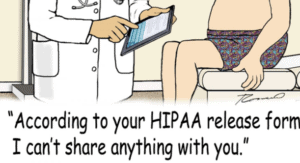What’s the Deal with Privacy (HIPAA) Forms?
 The Health Insurance Portability and Accountability Act of 1996 (HIPAA) is the law enacted to protect your privacy, allow access to your dental records and designate who can speak on your behalf and to whom we may speak to regarding your dental care. This law was written for the consumer, not the provider.
The Health Insurance Portability and Accountability Act of 1996 (HIPAA) is the law enacted to protect your privacy, allow access to your dental records and designate who can speak on your behalf and to whom we may speak to regarding your dental care. This law was written for the consumer, not the provider.
Every time you see a new dentist or doctor or go to the hospital, you are given a form to sign stating you understand the office or institution adheres to HIPAA guidelines, along with a form allowing communication with other dental or medical professionals in regard to your health.
A very important aspect of the HIPAA law is the right for you to designate who can speak for you. In order for anyone to speak on your behalf, a form must be filled out. This includes if you have someone helping with your insurance issues or bills. You have the right to designate as many people as you like and at Smile Sarasota we have a special place on our form for this designation. As funny as it may seem, we are not allowed to speak to your spouse or children about your dental treatment unless you designate them on this form.
Another important aspect of HIPAA is your right to have a copy of your dental or medical records. You cannot be denied a copy. You can request all the records or only certain parts. You can also designate what part of records can be sent to other medical professionals or institutions. Since records in our office are completely digital, for your protection and privacy we use an encryption program when we are asked to send attachments which contain any private information.
Many institutions and providers might make you think the law was designed for their needs. This is not the case. It was enacted to protect you, the consumer. Maintaining patient confidentiality is a priority for us, and our office is strictly HIPAA Compliant. If you have questions about HIPAA, contact our privacy officer, Jaime Still.
Click below to learn more about The HIPAA Privacy Law:
Learn more about patient privacy



